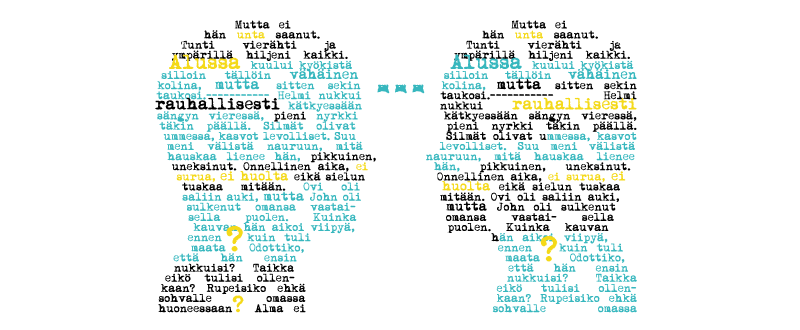Search results for "david barrett"
Arska
30 September 1982 | Archives online, Fiction, Prose
A short story from Kaksin (‘Two together’). Introduction by Pekka Tarkka
A landlady is a landlady, and cannot be expected – particularly if she is a widow and by now a rather battered one – to possess an inexhaustible supply of human kindness. Thus when Irja’s landlady went to the little room behind the kitchen at nine o’clock on a warm September morning, and found her tenant still asleep under a mound of bedclothes, she uttered a groan of exasperation.
“What you do here this hour of day?” she asked, in a despairing tone. “You don’t going to work?”
Irja heaved and clawed at the blankets until at last her head emerged from under them.
“No,” she replied, after the landlady had repeated the question.
“You gone and left your job again?”
“Yep.” More…
The Confirmation Present
30 June 1980 | Archives online, Fiction, Prose
An excerpt from Rakas rouva K (‘Dear Mrs K.’, 1979). Introduction and interview by Auli Viikari
Lahtinen read through what he had written so far, and it pleased him, especially the quotation from Clausewitz. “It could be said,” he went on, “that the victories of the French Revolution during those two decades were due in most cases to the mistaken policies of its opponents, even though the actual coup that shook the world took place within the framework of war.” His article was about the British attitude to Germany’s expansionist policies. There would not be another Munich, he felt sure: the House of Commons had cheered Chamberlain for the last time. Where, he asked himself, would England eventually abandon the role of passive onlooker? At Danzig, surely. It would not be like Poland to give something for nothing. She would set a world war in motion, of that he had no doubt. And he could see Poland dissolving into ruin before his very eyes. More…
Jingle-bells
30 September 1992 | Archives online, Fiction, Prose
An extract from Täällä Pohjantähden alla (‘Here beneath the North Star’), part one, chapter five. Introduction by Pekka Tarkka
Tähti, the rectory’s black carriage-horse, trotted from croft to croft, flashing his white spats. In the sledge, behind the driver, was the rector’s wife, wearing her husband’s heavy fur coat and sitting up very straight.
She began at Koskela. Jussi had finished his rent-work for the week, so she had to drive out to the croft. The little sleigh-bells tinkled so prettily that the boys overcame their shyness and came outside to marvel. These were quite unlike the simple, tinny ‘jingles’ that the old crofters had on their sledges: there was a whole row of bells attached to each half of the smart leather harness-saddle, and they sang out pleasantly and musically every time the highly-strung thoroughbred moved or even quivered. Vilppu could hardly claim to belong to the same species as this splendid creature. The boys had never before seen Tähti at such close quarters. He had wonderful blue-black eyes, and a soft pink muzzle. More…
How Real is a Dead Person?
30 September 1979 | Archives online, Fiction, Prose
An Extract from the Novel Sirkus (‘Circus’). Introduction by Pekka Tarkka
Once again I seem to be moving towards a deeper understanding of these people who figure in my recollections, most of whom, by now – by this particular Friday I am now experiencing – are already dead. And this, in its turn, sets me wondering about the degree of reality, if any, that they can claim to possess. How real is a dead person? Is he, perhaps, totally unreal? In memories, of course, he is real to the extent that the memories themselves are real. But objectively, independently of memory? But here a sadness comes over me, many-headed, hard to take hold of.
And in any case I think it is time I came to a clearer understanding of the economic circus founded by my grandfather Feodisius. Uncle Ribodisius has also already made the front pages of the newspapers, and the Bilbao has published an interview.
But I have left a picture unfinished. Father’s cardboard boxes! The separation from Dianita – and from the children! And I have broken off in the middle of these curious memoirs of mine. Thinking of which, I find myself grinding to a halt again, stuck with Yellow-Handed Fred and Haius and Desmer, Lesmer and Sesmer – until I realize that instead of coming to a clearer understanding of my grandfather’s economic circus, I am on Lesmer’s estate, one evening in late May – a couple of months ago – listening to the trilling of an unusually talented song-thrush. Perched on the top of a tall spruce, he goes through the repertoire of all the other birds he has ever heard, both native and foreign – creating, however, new combinations of his own; not content with mere mimicry, he rattles, croons, wails, whistles, whirrs, twitters, flutes, sighs, chirrups and shouts his way through a complete set of variations on themes provided by the rest of the bird world: like some rather advanced medieval chronicler who, no longer content to record faithfully (if perhaps chaotically, as Auerbach points out) what he saw, heard, thought and smelt, had begun to create personal shapes and entities – thus preparing the way for the greatest miracle in the history of world literature, the advent of the perceptive reader. More…
A spot of transmigration
13 January 2011 | Fiction, Prose
A short story, ‘Sielunvaellusta’, from the collection Rasvamaksa (‘Fatty liver’, WSOY, 1973)
‘Where will you be spending Eternity?’ a roadside poster demanded as Leevi Sytky sped by in his car.
‘Hadn’t really thought about it,’ Leevi muttered , as if in reply, and lit a cigarette.
But at the next level crossing, a kilometre or so further on, he was run down by a train, whose approach he had failed to notice. His attention had been distracted by the sight of a young woman who was picking black currants by the side of the track, and who happened to be bending forward in his direction. Intent on obtaining a better view of her ample bosom by peering over the top of her blouse, Leevi neglected to look both ways, and death ensued. Damned annoying, to say the least.
In due course he secured an interview with God, who turned out to be a biggish chap, about a hundred metres tall, wearing thigh-boots and sitting behind a large desk.
‘Well, and how’s Leevi Sytky getting along?’ God asked, lighting his pipe.
‘Mustn’t grumble,’ said Leevi politely.
‘And how are you thinking of spending Eternity?’ God inquired, sucking at his pipe and puffing out his cheeks. More…
Patsy, the artist of the lumber camps
31 December 1984 | Archives online, Fiction, Prose
A short story from Atomintutkija ja muita juttuja (1950). Introduction by Aarne Kinnunen
Deep in the wilds, where the only sound is the sad, primeval sighing of the forest, it is easy to succumb to a mood of boredom and melancholy. It may sometimes occur to you that in such a place you are wasting your life. Real life goes on elsewhere, in places with more people, more signs of human activity, more light, more gaiety…
You fell a tree, severing a string of that mighty instrument, the forest. You saw it into logs, you strip off the bark: it all seems dull and pointless. Sometimes the rain decides to go on for days: the trees have streaming colds, droplets hang from every needle-tip. You make for the shelter of a lumber camp. But the low-roofed rest-hut, deep in the forest, looks a dreary place, the well-known faces are so dull, the talk so futile. You feel you know in advance what each man is going to say. And the food, too, is just the same as usual, the same old rubbishy mush. The sight of the pot, with its blackened sides, gives no pleasure: you know all too well what is in it. And those grubby playing-cards, how disgusting! The mere sight of them is enough to make you feel defiled… More…
A Wedding Dance
31 March 1977 | Archives online, Fiction, Prose
An extract from the novel Kivenpyörittäjän kylä (‘The stoneroller’s village’). Introduction by Hannes Sihvo
Pölönen got up and went over to his accordion, which he had dumped beside the juke-box. He walked with his stocky trunk thrust forward, his hands dangling; the wallet he had crammed into his hip-pocket, constrained to follow the curve of his fat buttock, made an unsightly bulge suggestive of some kind of excrescence. With a vigorous shoulder movement he hoisted the instrument into position. At once the neck of the bottle in his inside pocket came into view, emitting spurts of foam, and it was some time before he noticed it and managed to nudge it back so that it would lean the other way. Scarlet in the face and streaming with sweat, glaring angrily and doing his utmost to avoid looking in the direction of the assembled company, Pölönen drew some air into the bellows and tried out various notes and chords, fingering the keyboard with an airy nonchalance intended to suggest that he was a complete master of his instrument. All eyes were turned upon this podgy, fair-haired man, with the suit that was far too tight across the shoulders and under the armpits, the very small and rather crumpled tie, the tapering trouser legs with shiny bulges at the knees. The warming-up process continued for what seemed an unconscionably long time, and a certain amount of shuffling and coughing began to be audible; old Nestori Pölönen gazed stiffly down at his shoes, and Saara’s movements, as she busied herself behind the coffee-table, became more and more fidgety. More…
Poems
30 September 1984 | Archives online, Fiction, poetry
The poems of Aleksis Kivi were long considered no more than a peripheral aspect of his work. They were, as Kivi’s friend Kaarlo Bergbom wrote in a review, ‘gold that can’t be minted into coins’. The reason appears to have been Kivi’s poetic technique, which made a clear break with tradition. He did away almost completely with rhyme and instead emphasised the rhythm and musical sound qualities of words. He shortened words in a way that did not find favour with any subsequent Finnish poets. He avoided emotional expressions of patriotism and romantic love poetry; instead, he composed poems that were extended, narrative and fresco-like. Lauri Viljanen, whose 1953 study brought about a re-evaluation of Kivi’s poetry, has given them the apt soubriquet ‘epic idyll’.
The first of Kivi’s poems appeared in the Kirjallinen Kuukauslehti (‘Literary monthly magazine’) in 1866; a collection of his poetry entitled Kanervala was published the same year. Other poems appear in his novels and plays, and some have appeared in a collection after his death. Karhunpyynti (‘The bear hunt’) is from Kanervala. Its descriptive nature is typical of Kivi. The verse structure is tightly controlled but unrhyming. The winter landscape of the third verse, repeated at the end of the poem, is a ceremonious point of rest among the otherwise busy activity.
– Kai Laitinen
![]()
The Bear Hunt
The men on skis set out for the forest, a brave company
With guns and bright spears
And clamouring dogs on the leash,
With blazing eyes,
As the dawn chases gloomy Night
From the sky’s brow,
And the sun raises his head. More…
In the early hours
31 March 1976 | Archives online, Fiction, Prose
An extract from Dyre Prins (‘Sweet Prince’, 1975). Introduction by Ingmar Svedberg
Donald Blaadh, a retired businessman, has been called to visit an influential acquaintance in the middle of the night.
He was sitting in the library, listening to Shostakovich, the Leningrad Symphony. The slow crescendo. The insistent march rhythm. Dogged endurance. Indomitability. He switched it off when I came in.
“I can’t sleep,” he said.
“Neither can I.”
He ignored the ironic undertone. “Shostakovich sharpens the decisionmaking faculties, the way chess sharpens the wits,” he said. “A sort of exercise routine … but I forgot, you don’t play chess.”
“No, but I do play the gramophone.”
“To-day I’m going to start you off with a quiz: whose immortal words were these, ‘Minerva’s owl never takes to the air till twilight is falling’?”
“I don’t know.” More…
Front-Line Tourists
30 September 1976 | Archives online, Fiction, Prose
An extract from the novel Nahkapeitturien linjalla (‘On the tanners’ line’, 1976)
Paavo Rintala (born 1930) published his first novel in 1954 and since then has brought out a new book almost every year. A merciless critic of the myths surrounding certain national figures and events, he has written about Marshal Mannerheim, against attempts to glorify war, and the ‘inevitability’ of Finland’s involvment in the German Barbarossa plan. He has made considerable use of reportage technique to produce anti-war documentaries and in more recent years worked with international subjects.
His books have been widely translated and are popular in East and West Europe. Paavo Rintala’s novel Sissiluutnantti (‘Commando Lieuenant’, Otava 1963) and its reception were the subject of a book by the ltterary critic Pekka Tarkka (Paavo Rintalan saarna ja seurakunta. ‘Paavo Rintala’s sermon and congregation’, Otava 1966). Paavo Rintala is chairman of the Finnish Peace Committee. The passage below is taken from Nahkapeitturien linjalla (‘On the tanners’ line’, Otava 1976) in which he again turns his attention to the war years. Rintala looks at the events of the years leading up to the war and the course of the war itself through the eyes of many different people – from the leading politicians of the day to the ordinary soldier.
The novel has already been acclaimed as the monument to the ‘unknown soldier’ of the Winter War.
![]()
Hessu duly presented himself at the Viipuri office of the Army Information Department (Visitors’ Escort Section), where it was implied that the expected visitors were Very Important People and that a singular privilege was being conferred upon Hessu and such front-line troops that the party might visit. Although His Excellency Field-Marshal Mannerheim made it a rule never to allow front-line visits by ordinary journalists or even by special correspondents, these gentlemen were, it seemed, such influential people that H.E. had agreed to their visit without demur. “You understand, Padre, what a great responsibility this will be for you? These are very high-up people.” More…
Friendly voices
27 April 2015 | Letter from the Editors

No one could call reading – or writing, for that matter – a social activity. No matter how many reading, or writing, groups you may choose to join, the actual engagement with a book is something you do alone.
Music, theatre, cinema, dance – those really are social enterprises. You can go to them together; you can watch them together, at the same time; you can talk about the experience you’ve shared. Even computer games, which sometimes seem to their elders to be making solipsists of all our children, are social, even if the ‘friends’ they play with may be the other side of the world, and may not speak the same language.
You’re never alone with a good book, as the advertising slogan says. But you’re not exactly in company, either… except…. More…
When sleeping dogs wake
31 December 1994 | Archives online, Fiction, Prose
Extracts rom the novel Tuomari Müller, hieno mies (‘Judge Müller, a fine man’, WSOY, 1994). Introduction by Soila Lehtonen
In due course the door to the flat was opened, and a stoutish, quiet-looking woman admitted the three men, showed them where to hang their coats, indicated an open door straight ahead of them, and herself disappeared through another door.
After briefly elbowing each other in front of the mirror, the visitors took a deep breath and entered the room. The gardener was the last to go in. The home help, or whatever she was, brought in a pot of coffee and placed it on a tray, on which cups had already been set out, within reach of her mistress. The widow herself remained seated. They shook hands with her in tum. The mayor was greeted with a smile, but the bank manager and the gardener were not expected, and their presence came as a shock. She pulled herself together and invited the gentlemen to seat themselves, side by side, facing her across the table. They heard the front door slam shut: presumably the home help had gone out. More…


